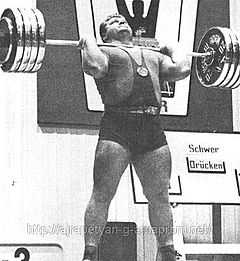| Olympic medal record
|
| Men's weightlifting
|
Competitor for the  Soviet Union Soviet Union
|
| Olympic Games
|
| Gold | 1964 Tokyo | +90 kg
|
| Gold | 1968 Mexico City | +90 kg
|
| World Weightlifting Championships
|
| Bronze | 1963 Stockholm | +90kg
|
| Gold | 1964 Tokyo | +90kg
|
| Gold | 1965 Teheran | +90kg
|
| Gold | 1966 East Berlin | +90kg
|
| Gold | 1968 Mexico City | +90kg
|
| European Weightlifting Championships
|
| Silver | 1963 Stockholm | +90kg
|
| Gold | 1966 East Berlin | +90kg
|
| Gold | 1968 Leningrad | +90kg
|
| USSR Weightlifting Championships
|
| Silver | 1961 Dnepropetrovsk | +110kg
|
| Silver | 1962 Tbilisi | +110kg
|
| Silver | 1963 Moscow | +102.5kg
|
| Gold | 1964 Kiev | +102.5kg
|
| Gold | 1965 Yerevan | +102.5kg
|
| Gold | 1966 Moscow | +102.5kg
|
| Gold | 1967 Lugansk | +102.5kg
|
| Gold | 1965 Rostov-Na-Donu | +110kg
|
| Summer Spartakiad of the USSR
|
| Silver | 1963 Moscow | +102.5kg
|
| Gold | 1967 Moscow | +102.5kg
|
| Cup of the USSR
|
| Gold | 1973 Tuapse | +110kg Snatch
|
| Gold | 1973 Tuapse | +110kg Clean & Jerk
|
| Gold | 1973 Tuapse | +110kg Total |

Zhabotinsky
Leonid Ivanovych Zhabotynsky (Ukrainian: Леонiд Iванович Жаботинський; born 28 January 1938, in Ukraine) was a Soviet Union weightlifter who set 17 world records in the superheavyweight class, and won gold medals at the 1964 and 1968 Olympics.[1]
Early life
Leonid was born in a village in Uspenka, Sumy Oblast, Ukrainian SSR into a Cossack family.[2] Zhabotynsky, spent his childhood years in Zaporozhye. After graduating from the seven-year secondary school, Leonid worked at the Kharkiv Tractor Plant and was coached at the local weightlifting club of the Armed Forces sports society.[2]
Weighlifting career
Zhabotynsky debuted at the Ukrainian SSR Championship in 1957, where he earned a bronze medal.[3] Later that year, Zhabotynsky entered the Kharkiv Pedagogical Institute and studied there until 1964. At the 1961 USSR Championship in Dnipropetrovsk Zhabotynsky earned silver with the result of 500 kg.[3] Two years later he set his first world record, starting an outstanding series of international achievements. Zhabotynsky was the flag bearer for the Soviet Union during the opening ceremonies of the 1968 Summer Olympics in Mexico City and caused a stir by carrying the Soviet flag single-handed when the team marched in.[3] Between 1963 and 1970 Zhabotynsky set 17 world records in the superheavyweight class and won gold medals at the 1964 and 1968 Olympics.[3] The famous rivalry between him and Yury Vlasov at the 1964 Summer Olympics was one of the most memorable moments of that Games. He was a member of CPSU between 1965 and 1991.
World records
- 7-31-1963 Snatch – 165 kg Super Heavyweight Moscow[3]
- 9-13-1963 Snatch – 167.5 kg Super Heavyweight Stockholm
- 3-22-1964 Snatch – 168.5 kg Super Heavyweight Moscow
- 3-22-1964 Clean & Jerk – 213 kg Super Heavyweight Moscow
- 3-22-1964 Total – 560 kg Super Heavyweight Moscow
- 10-18-1964 Clean & Jerk – 217.5 kg Super Heavyweight Tokyo
- 11-2-1965 Snatch – 173 kg Super Heavyweight Teheran
- 4-17-1966 Snatch – 173.5 kg Super Heavyweight Cairo
- 10-21-1966 Clean & Jerk – 218 kg Super Heavyweight Berlin
- 6-18-1967 Snatch – 174 kg Super Heavyweight Sofia
- 6-18-1967 Clean & Jerk – 218.5 kg Super Heavyweight Sofia
- 6-18-1967 Total – 590 kg Super Heavyweight Sofia
- 8-3-1967 Snatch – 175.5 kg Super Heavyweight Moscow
- 8-3-1967 Clean & Jerk – 219 kg Super Heavyweight Moscow
- 8-16-1967 Clean & Press – 201.5 kg Super Heavyweight Sofia
- 5-19-1968 Clean & Jerk – 220 kg Super Heavyweight Lugansk
- 6-25-1968 Snatch – 176 kg Super Heavyweight Leningrad
- 12-18-1973 Snatch – 183.5 kg Super Heavyweight Tuapse
- 2-21-1974 Snatch – 185.5 kg Super Heavyweight Moscow
External links
References
|
|---|
|
1920–1948: +82.5 kg, 1952–1968: +90 kg, 1972–1976: 90–110 kg, 1980–1992: 100–110 kg, 1996: 99–108 kg, 2000–2008: 94–105 kg | | |
|
| Persondata |
|---|
| Name |
Zhabotinsky, Leonid |
| Alternative names |
|
| Short description |
Soviet weightlifter |
| Date of birth |
January 28, 1938 |
| Place of birth |
|
| Date of death |
|
| Place of death |
|
